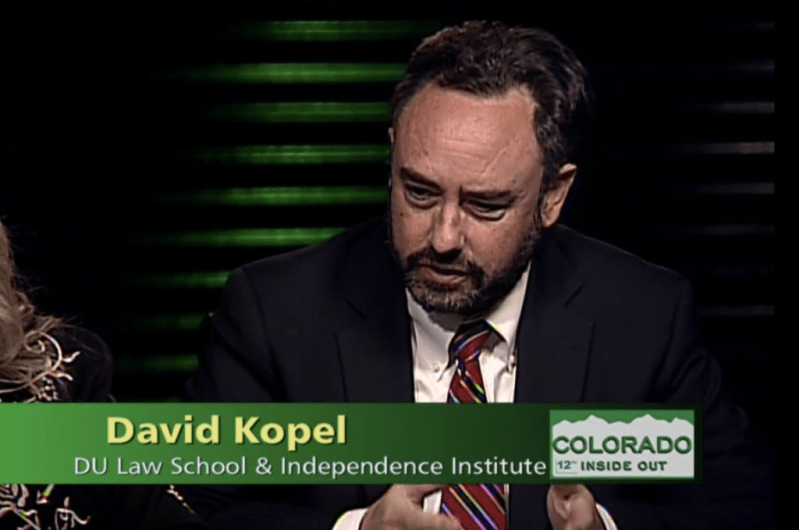Lazy Local Pundits See No Problem With CDOT’s I-70 Widening

CDOT’s plan to widen I-70 through Elyria, Swansea, and Globeville gets all sorts of hot takes. No surprise there — the $1.7 billion boondoggle is the most consequential public project in the pipeline right now.
Our local pundits, however, fail to grasp how damaging this road expansion will be to nearby neighborhoods and the city as a whole. Take a segment that aired last week on Colorado Public Television’s “Colorado Inside Out.”
The topic was the federal investigation into whether the highway violates the Civil Rights Act, and the panel was decidedly tilted in one direction. No one on the air represented the perspective of the neighborhood advocates fighting this project.
“How big of a deal is this?” asked host Dominic Dezzuti.
“I think not, although we’ll see what the feds come up with in their investigation,” responded David Kopel, research director at the Independence Institute — the same think tank that prefers car lanes to light rail along I-25. Kopel tried to dismiss the highway opponents’ case by asserting that “impacts happen everywhere this is done.”
The relevant question, however, is whether the I-70 project will disproportionately affect historically marginalized communities. There’s little doubt that it will. The predominantly Latino neighborhoods by this part of the highway already deal with worse air quality and elevated rates of chronic diseases because of I-70-related pollution — add the traffic generated by widening the highway, and those public health disparities will only get worse.
There’s a much less disruptive option: Rerouting I-70 north along I-76/270 would affect fewer people. For every home along that stretch, there are 21 along the north Denver segment of I-70, according to counts done by neighborhood advocates.
Kopel erroneously claimed that the neighborhood groups will have to prove intentional discrimination to win. If CDOT decided to expand I-70 in north Denver to “harm people based on their race, then we’ll find out if that was the motive or not,” he said.
But intentional discrimination is not the issue at play here. What matters is whether the project will have a “disparate impact” on minority populations.
Kopel, a University of Denver constitutional law professor, should review the recent civil rights case against Bay Area Rapid Transit over its airport rail line. The feds pulled $70 million from that project after concluding that BART failed to study the project’s effect on low-income residents. Advocates showed that BART overlooked disadvantaged people, not that the agency chose to build the line to deliberately hurt them.
Later in the segment, Dezzuti asks attorney Penfield Tate III if “there’s something to the specific history of this neighborhood that will affect this case.”
“I don’t know,” said Tate, who works for the law firm hired by CDOT to work out the financing for the I-70 project. “What is clear is that CDOT has spent seven, eight, nine years researching this plan, meeting with the neighborhoods.”
Anyone who’s passingly familiar with the history of the area (and whose employer isn’t paid by CDOT) would know that in the 1960s, the agency pushed I-70 through immigrant, working class neighborhoods — which attorneys spell out in the civil rights complaint [PDF]. But Tate either doesn’t know that history, doesn’t consider it relevant, or intentionally decided not to embarrass CDOT by bringing it up on television.
Then there’s political analyst Eric Sondermann, who bemoans the resistance that will meet Donald Trump’s “infrastructure” package.
“One of the real problems that he will face… is the amount of litigation that accompanies any attempt to really build anything in this country,” Sondermann said. He blamed “BANANAs” (build absolutely nothing anywhere near anything). “There are BANANA interests who just do not want to build or improve this country’s infrastructure if it has any adverse effect at all, and it’s always gonna have some adverse effect on someone.”
Absent from Sondermann’s analysis is any attempt to judge whether the infrastructure serves any beneficial purpose. It doesn’t matter that more highway lanes just fill up with cars after a few years, making traffic and pollution worse. To his way of thinking, all infrastructure is good infrastructure.
But digging a 40-foot trench in contaminated soil to pump more cars through the city is not the kind of infrastructure Denver should be building in the 21st century. Just ask the CDOT engineer who called the project “an engineering nightmare.”
The people fighting the I-70 widening get that bigger highways aren’t the infrastructure Denver needs right now. Someone should put them on televisions alongside our local punditocracy.


